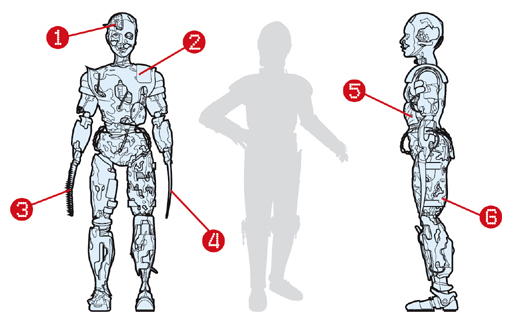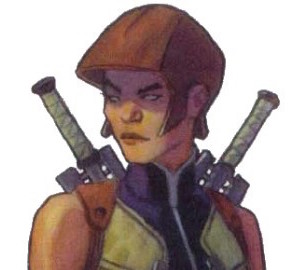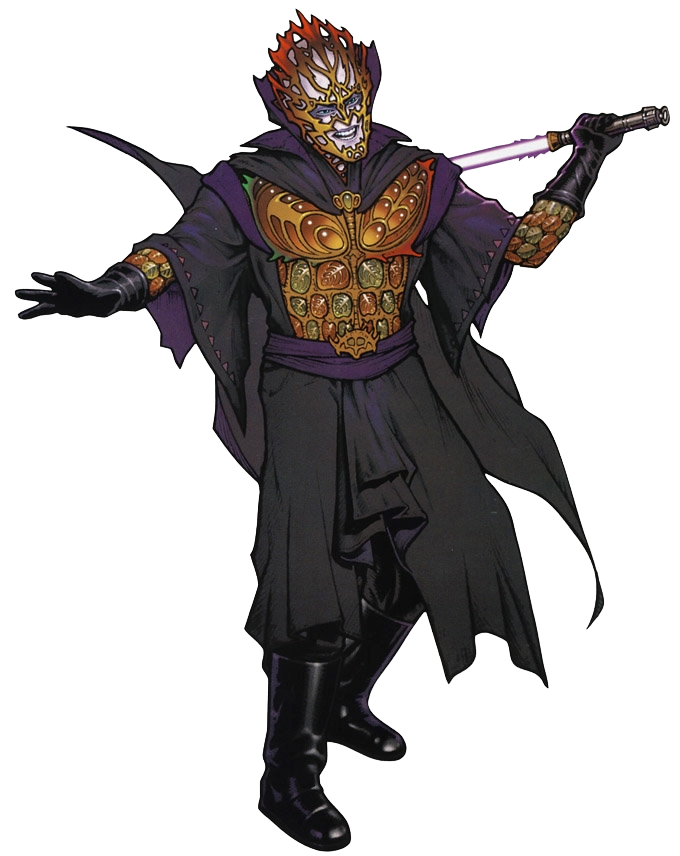Technobeasts were part machine, part organic Sithspawn mutants. They were created by infecting living organisms with the nanogene spore, a technovirus developed through a combination of Sith alchemy and a Force technique called mechu-deru. The virus grew metallic tumors over the bodies of its victims, ultimately lobotomizing their brains and transforming them into weaponized cyborgs. Living subjects from a number of different species were infected by the virus, spawning mutated amalgamations of metal and flesh in a variety of shapes and sizes.
In the last quarter of the New Sith Wars, a Dark Lord of the Sith known as Belia Darzu devised a dark side ritual called mechu-deru vitae, using it to build her own army of technobeasts—the Metanecrons. Housing the creatures inside a hidden stronghold on the planet Tython, Lord Darzu used her army of mutated cyborgs against the Galactic Republic and the Jedi during the two-decade Sictis Wars. The subsequent assassination of Darzu ended the creation of new Sithspawn hybrids, leading to their disuse after the conclusion of the New Sith Wars.

Schematic of a humanoid technobeast. (1. lobotomized brain 2. nanospore pores 3. saw blade 4. cutting blade 5. metallic tumor 6. metallic growths)
Technobeasts were characterized by an infection from the nanogene spore, a technovirus capable of transmuting living tissue into metallic parts. Consisting of microscopic nanogene droids, the technovirus instinctively moved towards the brain of the victim, lobotomizing their frontal lobe and rendering them incapable of higher thought. By this point, the subject's transformation into a Sithspawn hybrid was irreversible. Before the lobotomy took place, however, it was possible to halt the transformation through the power of the Force, or by purging the nanogene droids with intense heat. While they were initially deemed intelligent beings, technobeasts with long-term exposure to the nanogene spore would undergo severe mental degradation, limiting their motor functions and reducing the creatures to clumsy, shambling automata.
Once fully transformed, most remnants of living tissue on the creatures would have rotted away, leaving only small strands of skin and sinew surrounded by metallic scraps, rods and wires. The transformation also deteriorated the victim's vocal cords, rendering the technobeasts incapable of speech. Due to the innately experimental nature of the nanogene spore, the manner in which the subjects were transformed had varying results, making all technobeasts unique. Some of the creatures possessed zigzags of scarred tissue caused by the virus building upon its own metallic chunks. In other cases, victims ended up with multiple heads or crab-like pincers.
Designed primarily for destruction, most humanoid technobeasts had their arms replaced with skewers or saws, while others were known to have jagged blades extending from their elbows. Larger technobeast variants—specifically those created from rancors and banthas—were forged into war machines. In particular, the mutated rancors brandished a very large claw that resembled a club, though they were also known to bite their foes when given the opportunity. Along with the transformed banthas, the rancors bore spiked armor plating to replace their hides, in addition to having blaster cannons fused to their shoulders.
Infested with the nanogene spore, technobeasts were able to infect other living organisms with the virus, potentially transforming additional victims into the creatures themselves. The humanoid variants were capable of dispersing clouds of the technovirus from their mouths. In combat, the creatures became enraged while attacking their foes, relentlessly swarming against them in large numbers. Despite their aggressive nature, the technobeasts attacked in a slow, cumbersome manner. In addition, the creatures were vulnerable to heavy blasts of energy from the Force, as well as Sith lightning and lightsaber strikes.
Thousands of years before the Great Sith War, a small number of Sith magicians discovered mechu-deru, a Force technique granting them the ability to manipulate mechanical structures. Using this technique, the Sith created part-machine, part-organic hybrids known as technobeasts. The power of mechu-deru was practiced by only a few at this time, causing its secrets to fade into obscurity.

Belia Darzu, a Sith alchemist who created technobeasts during the New Sith Wars
In a later period called the New Sith Wars, a Dark Lord of the Sith by the name of Belia Darzu researched mechu-deru alongside Sith alchemy. With her knowledge of both, Lord Darzu derived a new technique known as mechu-deru vitae, using it to transform living beings into technobeasts by means of a nanogene virus. Bound to Darzu's will and imbued with the power of the dark side, the technobeasts were created and housed inside a secret fortress on the planet Tython. Within this stronghold, living beings from several different humanoid and non-humanoid races were transformed into technobeasts themselves, forming an army of the creatures known as the Metanecrons. In addition, Darzu constructed a holocron containing her knowledge of the techniques used to create the Sithspawn creatures.
The technobeasts of Belia Darzu were used against the Galactic Republic and the Jedi Order, becoming recognized as the signature horror of a two-decade conflict known as the Sictis Wars. In combat, the mutated hybrids infected other living beings with the nanogene virus, assimilating Darzu's fallen enemies into her cyborg army. On one occasion, however, a Jedi Knight prevented the virus from fully transforming him into a Sithspawn mutant, preserving his identity and becoming known as the "technobeast Jedi." By the end of the Sictis Wars in 1230 BBY, the production of new technobeasts came to a halt after Darzu was assassinated, sabotaging her army. Despite this, subsequent Sith Lords continued to utilize the creatures, though in smaller numbers than before. The use of technobeasts ended when the Sith were defeated at the Ruusan campaign in 1000 BBY.

Protected by his orbalisk armor, Darth Bane destroyed a horde of technobeasts on the planet Tython.
Over two centuries after the fall of Lord Darzu, some of her technobeasts remained active inside her stronghold on Tython. Years of disuse had left them in a dilapidated, rusted state, causing some of their weapons to malfunction. In addition, the creatures became mentally and physically debilitated by the long-term effects of the nanogene spore. Drawn towards the dark side energy radiating from the holocron of Belia Darzu, the surviving technobeasts congregated around the device within the inner sanctum of the Tython fortress.
In 990 BBY, a Sith Lord known as Darth Bane encountered the technobeasts on Tython while seeking the holocron of Belia Darzu. When Bane attempted to seize the device, the horde of mutated cyborgs immediately attacked him in waves. Despite their efforts to kill the Sith Lord, the creatures were unable to penetrate the defenses of his orbalisk armor. At various points throughout the skirmish, the technobeasts infected Bane with the nanogene spore, spewing clouds of the virus in his vicinity. Nonetheless, the orbalisk parasites on Bane's armor were able to purge the virus from his body, preventing the transformation. Despite their persistent attacks, the technobeasts inside the fortress were ultimately destroyed at the hands of Bane.
Centuries later, a number of Sith scrolls containing Belia Darzu's knowledge of mechu-deru were acquired by Roganda Ismaren, an agent of the Galactic Empire. In addition, the son of Roganda—the cyborg known as Irek Ismaren—possessed an accelerated mastery of mechu-deru by means of a brain transplant. Together, the pair had the potential to create and unleash a new horde of technobeasts upon the inhabitants of the galaxy. During the era of the Yuuzhan Vong War, the technobeasts and methods used to create them were discussed in Droids, Technology and the Force, an essay written by Jedi Knight Tam Azur-Jamin.
The technobeasts were first mentioned unnamed in Tales of the Jedi Companion, a roleplaying supplement published by West End Games in 1996. The creatures received yet another unidentified reference in The Lost Art, an adventure seed featured in the 2001 article entitled The Emperor's Pawns. In 2005, both of these references were retconned by Abel G. Peña, an author who named the creatures in a Hyperspace fan club article called Droids, Technology and the Force. The New Essential Guide to Droids provided more detailed information regarding the technobeasts in 2006, along with the first images of the creatures, by artist Ian Fullwood. The technobeasts made their debut appearance in Darth Bane: Rule of Two, the second novel of Drew Karpyshyn's Darth Bane Trilogy. The Junk Golem figurine included in The Force Unleashed miniatures set was once called a "technobeast." In the third part of The Imperial Warlords: Despoilers of an Empire, the alchemical creations of a character named Cronal were also dubbed "Trailian technobeasts."
- Tales of the Jedi Companion
- "The Emperor's Pawns" — Star Wars Gamer 5
- Droids, Technology and the Force: A Clash of Phenomena on Hyperspace
- Evil Never Dies: The Sith Dynasties on Hyperspace
- The New Essential Guide to Droids
- The Complete Star Wars Encyclopedia
- The Essential Atlas